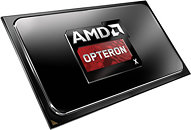- Joined
- Oct 9, 2007
- Messages
- 46,362 (7.68/day)
- Location
- Hyderabad, India
| System Name | RBMK-1000 |
|---|---|
| Processor | AMD Ryzen 7 5700G |
| Motherboard | ASUS ROG Strix B450-E Gaming |
| Cooling | DeepCool Gammax L240 V2 |
| Memory | 2x 8GB G.Skill Sniper X |
| Video Card(s) | Palit GeForce RTX 2080 SUPER GameRock |
| Storage | Western Digital Black NVMe 512GB |
| Display(s) | BenQ 1440p 60 Hz 27-inch |
| Case | Corsair Carbide 100R |
| Audio Device(s) | ASUS SupremeFX S1220A |
| Power Supply | Cooler Master MWE Gold 650W |
| Mouse | ASUS ROG Strix Impact |
| Keyboard | Gamdias Hermes E2 |
| Software | Windows 11 Pro |
Red Hat Summit 2014 -- AMD today announced another major milestone in the development of its enterprise software ecosystem with the first public demonstration of its second-generation AMD Opteron X-Series APU, codenamed "Berlin," running a Linux environment based on the Fedora Project. The Fedora Project is a Red Hat-sponsored, community-driven Linux distribution, providing a familiar, enterprise class operating environment to developers and IT administrators worldwide. This is important to companies looking to transition to x86 APU servers but who are reluctant to introduce new tools and software platforms to their IT environments. This demonstration also represents a significant step forward in expanding the footprint of x86 APU accelerated performance within the data center.
AMD's premiere demonstration of "Berlin" will showcase the world's first Heterogeneous System Architecture (HSA) featured server APU ahead of its official launch later this year. The demonstration features advancements incorporated in "Project Sumatra" that enable Java applications to take advantage of graphics processing units (GPUs) within AMD server APUs. The combination of Linux and Java on AMD APU platforms provides an ideal platform for server-based multimedia workloads and general purpose GPU compute that will help drive new levels of workload efficiency in the data center. AMD also will demonstrate software-based on OpenCL and OpenGL on "Berlin."

"As servers adapt to new and evolving workloads, it's critical that the software ecosystem support the requirements of these new workloads," said Suresh Gopalakrishnan, corporate vice president and general manager of the Server Business Unit, AMD. "We are actively engaged with a broad set of partners in the data center software community who are bringing to market the software infrastructure to seamlessly enable x86 APU based servers."
AMD is a founding member of the HSA Foundation, an organization dedicated to building robust ecosystems to support APU technologies. For more information please visit AMD's booth 621 at the Red Hat Summit today and tomorrow where the HP Moonshot M700 Cartridge based on the AMD Opteron X-Series X2150 APU, the upcoming second generation AMD Opteron X-Series "Berlin" APU, and the AMD SM15000 servers as well as partner technologies will be on display.
View at TechPowerUp Main Site
AMD's premiere demonstration of "Berlin" will showcase the world's first Heterogeneous System Architecture (HSA) featured server APU ahead of its official launch later this year. The demonstration features advancements incorporated in "Project Sumatra" that enable Java applications to take advantage of graphics processing units (GPUs) within AMD server APUs. The combination of Linux and Java on AMD APU platforms provides an ideal platform for server-based multimedia workloads and general purpose GPU compute that will help drive new levels of workload efficiency in the data center. AMD also will demonstrate software-based on OpenCL and OpenGL on "Berlin."

"As servers adapt to new and evolving workloads, it's critical that the software ecosystem support the requirements of these new workloads," said Suresh Gopalakrishnan, corporate vice president and general manager of the Server Business Unit, AMD. "We are actively engaged with a broad set of partners in the data center software community who are bringing to market the software infrastructure to seamlessly enable x86 APU based servers."
AMD is a founding member of the HSA Foundation, an organization dedicated to building robust ecosystems to support APU technologies. For more information please visit AMD's booth 621 at the Red Hat Summit today and tomorrow where the HP Moonshot M700 Cartridge based on the AMD Opteron X-Series X2150 APU, the upcoming second generation AMD Opteron X-Series "Berlin" APU, and the AMD SM15000 servers as well as partner technologies will be on display.
View at TechPowerUp Main Site





